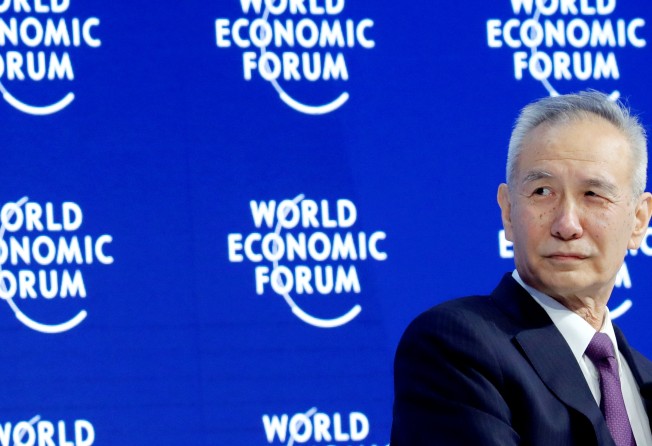Chinese President Xi Jinping’s top economic aide fails to inspire at World Economic Forum in Davos
Liu He might have sound personal credentials, but his promises of further reform only parroted Beijing’s pre-approved rhetoric, observers say

Despite his promise to foreign business executives to open up and reform China’s markets “beyond expectations” in 2018, observers struggled to find anything new in the speech made by Chinese President Xi Jinping’s top economic aide Liu He in Davos last week.
“Unlike Xi Jinping’s bold speech from a year ago, Liu gave a safe speech, safe for his domestic and international audiences,” said Scott Kennedy, director of the project on Chinese business and political economy at the Centre for Strategic and International Studies in Washington.
“There were multiple references to Xi Jinping, much touting of China’s economic success, and he held out the vague possibility of liberalisation,” he said.
“He entirely avoided the deep tensions between China’s rhetoric in support of free trade and globalisation, and its highly interventionist industrial policy system and policies that he has played a central part in managing over the past five years.”
Speaking at the World Economic Forum in the Swiss town, Harvard-trained policymaker Liu said China would introduce more reforms to open up its economy this year and that “some measures will exceed the expectations of the international community”.
Unsurprisingly, in his more than half an hour speech the 66-year-old director of the Office of the Central Leading Group for Financial and Economic Affairs, failed to provide any details of what form that opening up might take.
Instead, the man on course to become China’s vice-premier in charge of economic and financial affairs – his appointment is expected to be announced at the country’s legislative sessions in March – largely repeated what the top leadership said last year. Namely, that the world’s second-largest economy would push ahead with its supply-side reforms, pursue high-quality rather than high-speed growth, and would make curbing financial risk, alleviating poverty and preventing pollution its top priorities.
For Mats Harborn, president of the European Union Chamber of Commerce in China, Liu’s speech lacked commitment.
“While the European chamber recognises that some important initiatives have taken place in the last year, the direct impact on most foreign businesses has been limited,” he said.
“There is a frustrating gap between promises and action. A clear implementation timeline is now required.”
In his speech, Liu repeated an early promise made by Xi that China would further open up its financial markets, and said the government would enhance intellectual property protection, and ease the investment restrictions on foreign firms in the manufacturing and services sectors.
Steve Tsang, director of the SOAS China Institute at the University of London, said that despite Liu’s promises, it would be unwise for the global business community to think that anyone other than Xi was steering the ship when it came to China’s economic direction.
“Liu was hand-picked by Xi and it would make good sense to use his expertise in economic policy and the positive image he has to take charge of and deliver the economic reform package. But it will be naive to expect that it means Liu can proceed as he sees fit,” he said.
“Xi … clearly intends to leave his mark on the Communist Party and on China, so it is reasonable to expect that he will want to push for the changes he wants now that he has consolidated power. Liu’s speech confirms such an intention.”
Since Liu was elevated to the 25-member Politburo at the 19th party congress in October, he has been widely expected to take a front-row seat in helping to steer the Chinese economy.
“[But] He will work closely with Xi and will only deliver a programme that Xi agrees to and approves of,” Tsang said.
“The Davos rhetoric should not be seen as anything more [or less] than that. It is what Xi and Liu would like the top corporate world to hear. The Chinese government will implement policies that the [Communist] party judges as being good for China and the party, not what will be good for the Davos crowd. Nor will they see anything Liu said at Davos as tying the hands of the Chinese government,” he said.
Andrew Collier, managing director of Orient Capital Research in Shanghai, took a similar view. While acknowledging Liu’s personal credentials, he said he was unlikely to find it easy to push through any reforms or changes that were not already on the party’s agenda.
“Liu He is widely respected globally and has a reputation as a reformer. His short stint at Harvard has given him a taste of Western academic training, plus he has many contacts outside China,” he said.
“However, despite the leadership’s commitment to reform, there has been little evidence of progress. This is due to a combination of an overly centralised political structure at the top and difficult financial issues among local governments at the bottom. Liu is going to have a tough time tackling the reforms he is hoping to achieve.”
Zhu Haibin, an economist with JP Morgan Chase, said he found it interesting that Liu was upbeat in his assessment of the global economic outlook for 2018.
“In previous years, when Xi or Premier Li Keqiang talked about the global economy their tone was balanced, but this time [it] was much more positive,” he said.
“The possible implication is that that might allow more room for domestic reforms.”
Henry Chan Hing Lee, an adjunct research fellow at the National University of Singapore’s East Asia Institute, said it was also noteworthy that Liu said China would bring its overall leverage ratio under effective control in three years.
“The issue of over-leverage is often cited, both by the government and overseas observers, as the key danger to the Chinese economy,” he said.
Additional reporting by Sidney Leng